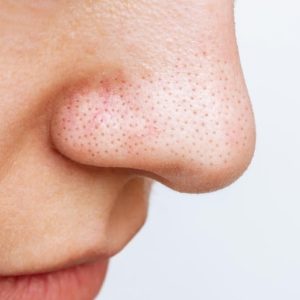Blackheads are a type of acne (known in dermatology as comedones) that occurs when a build-up of dead skin cells and excess oil (sebum) clog the pores on the skin’s surface. Unlike whitehead pimples that cause blemishes within closed pores, blackheads form in open pores or hair follicles through the oxidation of the pore’s impurities, giving them a dark color. People with oily skin types tend to be more susceptible to blackheads.
How to Prevent Blackheads
Follow these tips to avoid breakouts and prevent blackheads from forming in the first place:
- Ask your dermatologist about noncomedogenic products. Your makeup, moisturizer, or sunscreen may be the culprit behind your clogged skin. Ask your dermatologist if switching to oil-free, noncomedogenic products might help.
- Avoid touching your face. Touching or picking at your face spreads bacteria and can cause breakouts, scarring, and hyperpigmentation in acne-prone skin.
- Change your pillowcase regularly. Pillowcases harbor dirt and bacteria. Use clean pillowcases as often as possible to limit external pollutants, and avoid sleeping in your makeup.
- Follow a regular skincare routine. To prevent buildup, wash your face with a gentle cleanser according to a skin-care routine that works for you. Always wash your face to remove buildup, such as sweat from a long workout, makeup, dirt, or sunscreen.
- Use gentle exfoliation. Using your fingers, unclog pores with non-abrasive cleansers. Avoid using washcloths or harsh scrubs, which can irritate the skin.
How To Get Rid of Blackheads
If you have stubborn blackheads, you can try a DIY approach using over-the-counter products before seeing a dermatologist. To remove blackheads, try one of the following options:
- Chemical peels with AHAs and BHAs: Alpha hydroxy acids (AHAs) and beta hydroxy acids (BHAs) use chemical exfoliation to break down sebum and dead skin cells in your pores. Salicylic acid is the most commonly available BHA and often the first treatment dermatologists will suggest. You can also choose a more potent chemical peel containing glycolic acid, lactic acid, or citric acid.
- Face masks: A clay or charcoal mask improves skin appearance by drawing out impurities from your pores as they dry. They prove especially effective if you have oily skin. You may want to avoid them if you have dry skin since they can strip away moisture.
- Salicylic acid: Try treating blackheads using a gel cleanser made with salicylic acid, the first-choice BHA by dermatologists that breaks down excess oil and dead skin cells through chemical exfoliation. Use it once a day to avoid dryness, and discontinue use if you experience irritation.
- Topical retinoids: Retinol creams use the power of Vitamin A to unclog your pores and encourage cell turnover. Stronger retinoids typically require a doctor’s prescription, although you can find low concentrations of tretinoin over the counter. Retinoids may make your skin sensitive to sunlight, so always use them at night and wear sunscreen during the day. Learn more about the differences between retinol and retinoid.
- Use a skin brush: Exfoliating with a skin brush and a gentle face wash removes dead skin cells. Avoid this method if you have sensitive skin, and choose a quality soft brush. Always moisturize after using a skin brush.
If your blackheads persist, see a doctor for an evaluation. They may use a professional extractor for blackhead removal or prescribe oral medication and medicated creams to improve your skin.
Blackhead Treatments to Avoid
The products that work on other skin issues don’t necessarily work on blackheads. Avoid these less effective blackhead treatments:
- At-home extractions: Attempting to extract your blackheads manually may worsen your skin. Always see a dermatologist for professional extraction.
- Benzoyl peroxide: Benzoyl peroxide reduces inflammation and kills bacteria, making it an effective treatment for whitehead pimples. Since blackheads don’t swell or involve bacteria, benzoyl peroxide won’t improve them.
- Harsh scrubs: Over-exfoliation damages your skin, releasing more oil and exacerbating the conditions that cause blackheads. Always use gentle exfoliators, and limit exfoliation to two or three times per week.
- Pore strips: Pore strips do remove some impurities but tend to remove the good with the bad. Pore strips can strip your natural oils and hair follicles, causing skin dryness and irritation.
- Suction devices: Many products claim to “suck” the gunk out of your pores. Suction devices can break the capillaries in your facial skin and create long-term discoloration. When treating your blackheads, any approach you try should be gentle.




